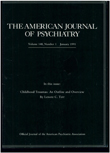Premorbid sociosexual functioning and long-term outcome in schizophrenia
Abstract
Chronic schizophrenic patients with the most severe social deterioration have been shown to differ from other chronic schizophrenic patients with respect to measures of left-to-right ventricular asymmetry, negative symptoms, and response to haloperidol treatment. In the current study, the authors investigated the social antecedents of these characteristics of very poor outcome schizophrenia in 69 chronic schizophrenic patients. Poor premorbid sociosexual functioning was associated with more severe left-to-right ventricular asymmetry, greater severity of negative symptoms, fewer positive symptoms, and worse current social functioning. These data suggest that factors associated with severe social deterioration in the end stage of schizophrenia are also associated with premorbid sociosexual impairment.
Access content
To read the fulltext, please use one of the options below to sign in or purchase access.- Personal login
- Institutional Login
- Sign in via OpenAthens
- Register for access
-
Please login/register if you wish to pair your device and check access availability.
Not a subscriber?
PsychiatryOnline subscription options offer access to the DSM-5 library, books, journals, CME, and patient resources. This all-in-one virtual library provides psychiatrists and mental health professionals with key resources for diagnosis, treatment, research, and professional development.
Need more help? PsychiatryOnline Customer Service may be reached by emailing [email protected] or by calling 800-368-5777 (in the U.S.) or 703-907-7322 (outside the U.S.).



